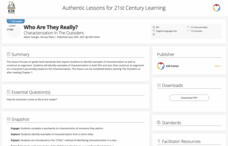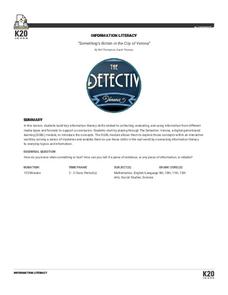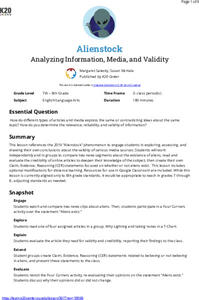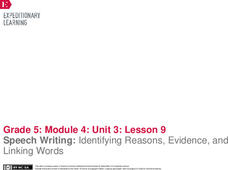K20 LEARN
Who Are They Really?: Characterization In The Outsiders
Ponyboy, Johnny, Winston, and Darry come alive in a lesson that focuses on the details S. E. Hinton uses to characterize the Greasers and the Socials. The class first observes the actors' words; the thoughts revealed their effect on...
K20 LEARN
Writing Is Elementary, My Dear Watson: Writing Paragraphs With Evidence And Reasoning
Did Smitty do it, or is he a victim? Sleuths apply their observation and reasoning skills to build a case for an argumentative paragraph. Class members closely observe a cartoon, make a claim, cite evidence from the image, and support...
K20 LEARN
Writing Wrongs Mini Lesson: Peer Editing And Revising
High schoolers draft a paragraph about their stance on the issue of school uniforms and share their work with a peer for editing. After watching a parody video about peer editing and revising, class members generate a "Top 10 list" of...
K20 LEARN
Lord of the Flies Unit, Lesson 8: In The End
To end the unit, groups use the Honeycomb Harvest strategy to show connections among a character, symbols, and themes in the novel and then create an Anchor Chart for the character that includes a symbol that best represents him. They...
K20 LEARN
Lord of the Flies Unit, Lesson 6: I've Got The Power
Readers of Lord of the Flies consider the symbols of power William Golding uses in his dystopian novel and support their choice with evidence from the text.
Core Knowledge Foundation
Unit 1: Hello, Universe by Erin Entrada Kelly Teacher Guide
Erin Entrada Kelly's award-winning novel, Hello, Universe is the anchor text in this 236-page teacher guide. The guide includes introductions to the Core Knowledge Language Arts (CKLA) program and the unit, a unit calendar, 12 lessons...
Anti-Defamation League
Bias, Bullying and Bad Behavior in the NFL
A 2014 case of locker room behavior in the National Football League offers high schoolers an opportunity to get involved in the conversation of bullying and abuse. Class members read about the case and analyze quotes that reveal...
K20 LEARN
Something's Rotten In The City Of Verona: Information Literacy
Data is a powerful tool that your class can use for both good and evil! Help your classes become knowledgeable consumers of information through a game-based exploration. Learners examine a method of determining the reliability of a...
Anti-Defamation League
What Is the Dream Act and Who Are the Dreamers?
The DREAM Act (Development, Relief, and Education for Alien Minors Act) is the focus of a lesson that asks high schoolers to investigate the act's provisions and read statements by individuals who support and oppose the act. They then...
Anti-Defamation League
‘Migrant Caravan’ and the People Seeking Asylum
The controversies surrounding migrants seeking asylum in the U.S. have recently been a hot topic. To understand some of the issues involved, young scholars investigate the Migrant Caravans of 2018. A 10-page packet, including photos, a...
K20 LEARN
Introduction to Arguing Effectively: Argument Writing
Which is better—Chick-fil-A or MacDonalds? High schoolers learn how to craft an argument essay by beginning an opinion statement. They state a claim, back up their claim with evidence, and consider counter calms. Scholars then create a...
K20 LEARN
Arguing With Evidence: Deconstructing Arguments Part 1
In the first lesson in a two-part series, high schoolers pick a social issue important to them and examine an article about the topic, the arguments and evidence used to support the writer's stance, and craft two counter-arguments to the...
K20 LEARN
Alienstock: Analyzing Information, Media, And Validity
One only has to watch MSMBC and FOX News to realize that media can present the same story in very different ways. Middle schoolers have an opportunity to test their ability to determine the validity and trustworthiness of information by...
Beyond Benign
The Story of Cosmetics Video Assessment
Does your shampoo contain carcinogens? Scholars learn how cosmetic companies create and market their products, many of which contain toxic chemicals. They examine the bias and consumer responsibilities in the industry.
ReadWriteThink
Persuasive Essay: Environmental Issues
Young environmentalists learn how to craft a persuasive essay about an environmental issue they consider important. After studying the components of a persuasive essay and examining a student model, writers brainstorm possible topics and...
Trinity University
Introduction to Poetry
Introduce fourth graders to poetry with a three-week unit that has them examine the structural elements of poetry, analyze poems, and craft their own original poems rich in sensory details and other poetic devices. Young scholars study...
National Endowment for the Humanities
Edgar Allan Poe, Ambrose Bierce, and the Unreliable Narrator
Stories by Edgar Allan Poe and Ambrose Bierce provide readers with an opportunity to investigate unreliable narrators. The lesson plan begins with an activity about different types of point of view and continues as scholars apply their...
K20 LEARN
Do Placebos Kill Minotaurs?
But it's just a game! Learners play a game to learn basic concepts of statistical hypothesis testing. After using the digital-game module, pupils develop their own statistical hypotheses and test them.
Academy of American Poets
Teach This Poem: "Imagine" by Kamilah Aisha Moon
A lesson about Kamilah Aisha Moon's poem "Imagine" asks young scholars to imagine, "What would happen if...?" If Dr. Martin Luther King's dream became a reality. If Renisha McBride was a white girl and crashed her car in a black...
Academy of American Poets
Teach This Poem: "Old South Meeting House" by January Gill O'Neil
The vaulted ceiling of the Old South Meeting House has heard many voices. Young scholars read an excerpt about its importance in American history and then do a close reading January Gill O'Neil's poem, "Old South Meeting House." After...
NASA
Introduction: Building Claims from Evidence
Making a claim without supporting it has little value. Learners work on their claim-making skills in a well-designed lesson. They view still images from a video and make claims using support from the visual representations. They then...
Newseum
Civil Rights: Knowns and Unknowns
Class members generate a list of research questions to review the civil rights movement and determine what scholars still need to learn. Groups then select a different compelling question, create a hypothesis and find evidence to support...
EngageNY
Speech Writing: Identifying Reasons, Evidence, and Linking Words
Enjoy the view. Scholars continue viewing a video of an opinion speech, this time identifying the supporting evidence the speaker employs. After watching, they work in small groups on their shared writing projects, crafting a body...
EngageNY
Mid-Unit 3 Assessment, Part II: Organizing Notes for a Public Speech
It's all a matter of opinion! Pupils take Part II of the mid-unit assessment, in which they continue organizing their notes in preparation for writing an opinion speech. Using the resource, they add reasons, evidence, and a concluding...

























